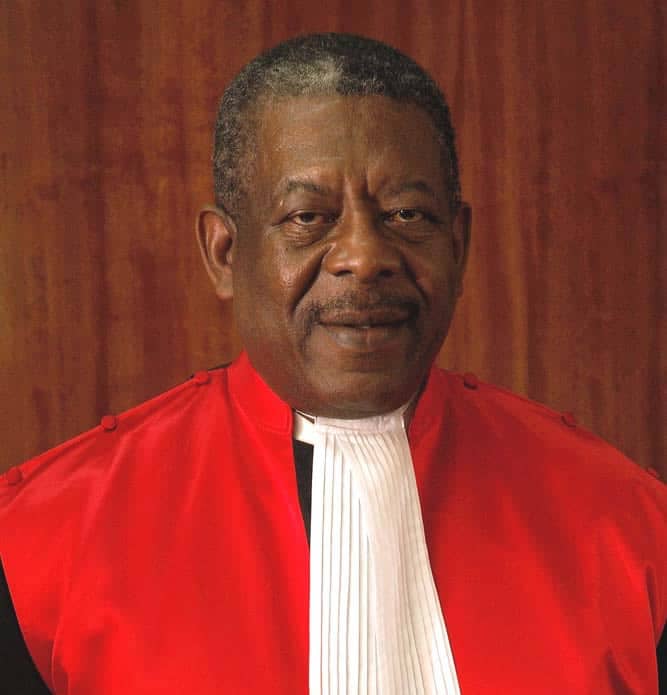
The sole commissioner advancing Dominica’s efforts towards electoral reform, Sir Dennis Byron, says the recommendations in his final report to the authorities here were “made in good faith and to develop the best electoral system for Dominica.
Speaking virtually at a consultation on electoral reform organized by the Dominica Business Forum Inc, Sir Dennis hoped the recommendations would help formulate an electoral system “that could potentially set standards for other countries in our region to follow.”
President of the Dominica Business Forum Inc, Daryl Bobb, said the intention of the consultation “is to get everybody involved in the discussion on electoral reform in an environment that provides for mutual respect and productive conversation, to get everybody involved in developing the concept, the idea of how this is supposed to be, how this is supposed to move forward.”
Prime Minister Roosevelt Skerrit told Parliament this week that he has no intention of “dragging the electoral reform matter up until the next general election” and that there would be ten days of public debate starting on August 14.
In June, Sir Dennis had written to both Prime Minister Roosevelt Skerrit and the president of the main opposition United Workers Party (UWP), Lennox Linton, indicating that he had “completed my review of the electoral legislation, systems, and processes in the Commonwealth of Dominica.
“This completes my assignment on the improvement of the electoral process in Dominica,” Sir Dennis wrote in his June 12 letter apologizing for not being able to meet the original deadline to have completed the exercise by April 2023.
He had been appointed as the sole commissioner advancing the efforts towards electoral reform, a significant issue in Dominica with the opposition parties, the UWP, and the Dominica Freedom Party (DFP), boycotting the last general election.
During the budget debate that ended here this week, Opposition Leader Jesma Paul Victor criticized the report, saying there were many issues still to be dealt with.
Speaking during the debate on the EC$1.3 billion (One EC dollar=US$0.37 cents) budget, Paul Victor, an independent legislator, said the report “does not ensure the cleansing of the voter’s list of those persons who have been resident overseas for the past five years as our law stipulates.”
She told legislators that the report also does not “provide any meaningful campaign finance reform given that the government-controlled Electoral Commission can increase the amount of election campaign during an election campaign.
“It imposes no limit on spending before the prime minister calls an election,” she said, adding, “It simply fails to provide for the need for voter identification cards with biometric data to counter the fraud effectively.
“Rather, it provides for national identification cards, which would not guarantee that persons holding these cards are eligible to vote. It fails to guarantee that all opposition parties have full access to private and public media, while it proposes certain monetary and custodial penalties for violating Dominica’s electoral laws”.
Paul said the report “fails to propose the additional penalty of having those convicted of violating Dominica’s electoral laws.”
But as he participated in the forum, the prominent international jurist said that in addition to the report, the reform proposals included draft legislation to give effect to the recommendations.
He told the forum that while the time limit placed on presentations would not allow him sufficient time to review the proposals thoroughly, he has nonetheless selected what he considered to be some “critical issues that can be addressed briefly within the allotted time.
He said regarding the “Register of Electors,” section seven of the bill stipulates that to qualify as a voter, “only those residing in Dominica are eligible for voter registration.”
Sir Dennis noted that over the years, concerns have been “over the bloating of the electoral register, “In 2019, for instance, there were 74,895 registered voters, with only 40, 762 casting their votes.
“It was considered possible that this was caused by deceased individuals and other ineligible electors remaining on the register. This led to the objective of introducing measures to cleanse the register of electors.
“The Registration of Elector’s bill proposes solutions, including mandating the chief registering officer to remove individuals who became disqualified regularly. One category for removal was those absent from Dominica for five years,” Sir Dennis said, adding, “This requirement is part of Dominica’s…enforced law”,
But he said the chief registration officer indicated that he was severely limited in managing objections on this ground due to difficulties interpreting the provision as there was no definition of access “and in accessing evidence of absence.
“The new draft legislation provided solutions for both of these difficulties,” he said, adding that “all registered voters are required to provide proof of their qualifications to be on the new register for confirmation.
“A name not confirmed will not feature in the new register, ensuring that the register would only contain qualified electors.”
He said fairness requires preventing disenfranchising eligible individuals already on the register, and the financial implication of confirmation would vary depending on the qualified person’s location and the cost of travel to Dominica, among other considerations.
“My report proposed various solutions for equitable arrangements using computer technology that would enable individuals who wished to retain their voting rights to do so without incurring travel expenses to Dominica.
“But the Act did not prescribe these measures. Section 52 provided the Electoral Commission with the authority to implement suitable measures. Consequently, if the Commission did nothing, everyone would have to travel to Dominica for confirmation,” Sir Dennis said, seeking to “rebut the false commentaries.
“It should be noted that persons residing overseas do not qualify to be registered as electors since, at the time of registration, they must have been living in a polling district for a continuous period of at least three months. However, if such persons are already registered as electors, they can be confirmed as electors, and if absent for five years, they can be removed from the register of electors.
“I propose an expectation that the Commission will make it unnecessary for registered voters to incur expenses to travel to Dominica to secure confirmation of their status,” he told the forum.
Regarding national identification cards relating to voters, Sir Dennis said, “The majority of respondents to our elections survey, which was opened to the general public, showed a preference for a multi-purpose ID card.
“I believe that a modernized national ID card would align with current trends in identity management. Consequently, I have incorporated provisions in the draft bill for issuing national ID cards. However, this will necessitate additional legislation for the proper issue, administration, and distribution of these ID cards.”
Reacting to “inaccurate comments” regarding election offenses, the former CCJ president said he was encouraging persons to refer to the phase two report, “which points out that the existing law of bribery…includes the payment, the promise of payment to a voter of his traveling expenses on the conditions expressed or implied that he or she will vote for a particular candidate”.
Sir Dennis said the House of Assembly Elections Bill |very carefully addresses and stipulates punishments for a wide range of election offenses” and that the crime of bribery is also addressed in the bill.
Regarding campaign financing, Sir Dennis said it received “meticulous attention” in the proposed new House of Assembly Bill, acknowledging that this type of regulation is new in Dominica and the wider Eastern Caribbean.
“But I must also add it is not new in the Commonwealth Caribbean as there is already a complete regulatory framework in Jamaica, and the subject has been featured frequently on the agenda of the Association of Caribbean Elections organizations consisting of 22 countries….which has existed since 1998.
He said the new legislation includes a provision for those limits to be varied by the Electoral Commission after consultation with the political parties and approval by resolution of Parliament.
“This is an appropriate and well-recognized constitutional process. The commentator who described the proposal on electoral expenditure as invoking the whims and fancy of Parliament was doing no more than undermining confidence in the rule of law,” Sir Dennis told the forum.
Advertise with the mоѕt vіѕіtеd nеwѕ ѕіtе іn Antigua!
We offer fully customizable and flexible digital marketing packages.
Contact us at [email protected]
















